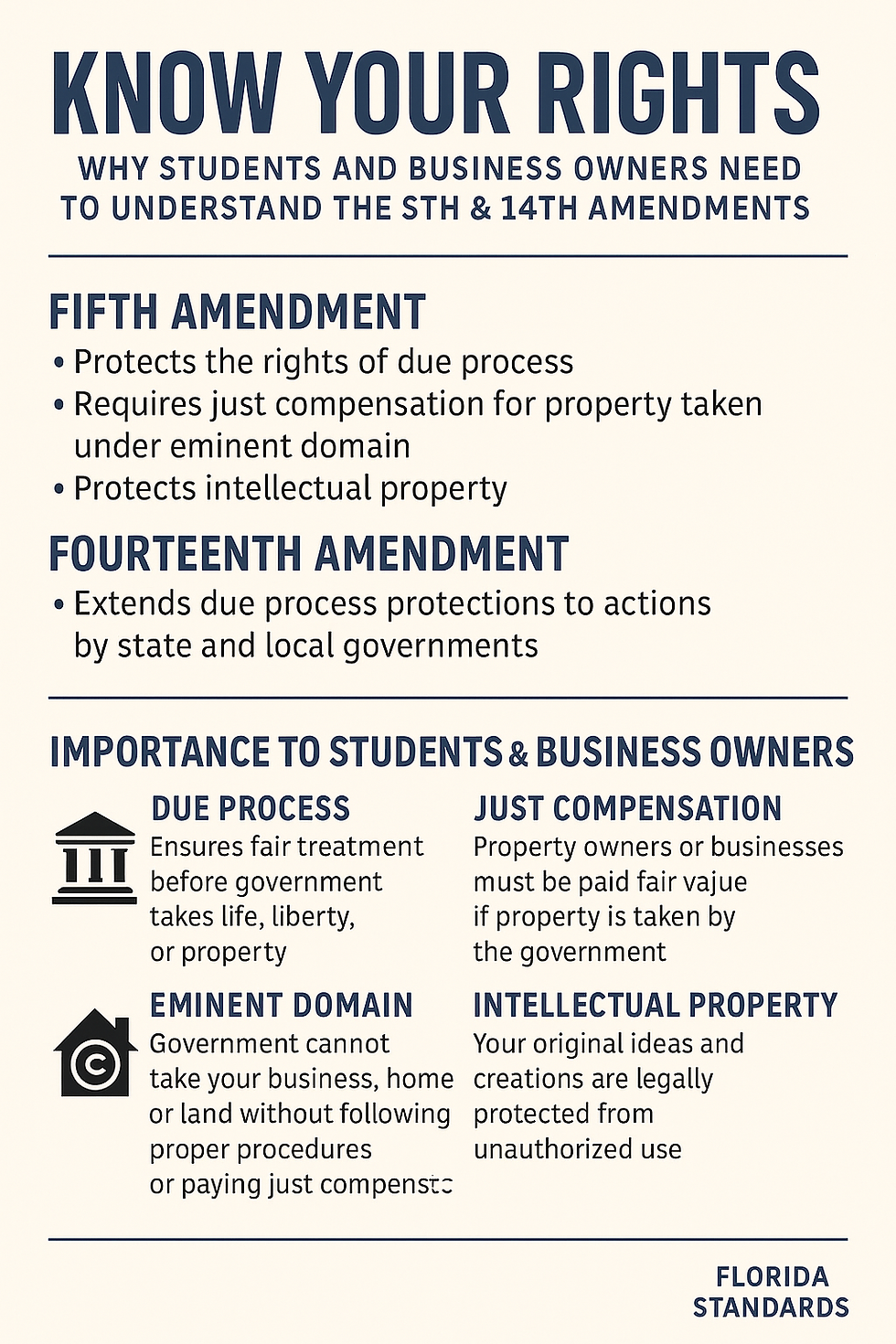Know Your Rights: Why Students & Business Owners Must Understand the 5th & 14th Amendments
- The Chairman

- Aug 8, 2025
- 3 min read

🏛 LESSON PLAN
Title: Know Your Rights: Why Students & Business Owners Must Understand the 5th & 14th Amendments Grade Level: 11–12 Subjects: Civics, U.S. Government, Financial Literacy, Business Education Duration: 1 class period (45–60 minutes)
🎯 OBJECTIVES
By the end of this lesson, students will:
Understand the core protections of the 5th and 14th Amendments to the U.S. Constitution.
Explain the role of due process in personal freedom and business rights.
Define and analyze just compensation and eminent domain.
Discuss how intellectual property is protected by Constitutional principles.
Recognize how Constitutional protections apply to entrepreneurs, business owners, and individuals.
📜 CONSTITUTIONAL FOCUS
5th Amendment
Protects against self-incrimination
Guarantees due process of law
Requires just compensation for property taken under eminent domain
14th Amendment
Extends due process protections to actions by state and local governments
Ensures equal protection under the law
📚 FLORIDA STATE STANDARDS ALIGNMENT
Civics and Government
SS.912.C.1.5: Evaluate how the principles of rule of law protect the rights of citizens and maintain order.
SS.912.C.2.4: Evaluate rights contained in the Bill of Rights and other amendments to the Constitution.
SS.912.C.3.10: Evaluate the significance and outcomes of landmark Supreme Court cases.
Personal Financial Literacy and Business
SS.912.FL.1.1: Explain how education, career choices, and entrepreneurship affect earning potential.
SS.912.FL.4.4: Describe the legal protections available for intellectual property such as patents, trademarks, and copyrights.
SS.912.FL.6.3: Explain how government regulations and legal systems affect business operations.
📝 LESSON OUTLINE
🔹 Warm-Up (5–10 min)
Prompt: “If someone took your business, land, or invention—what rights should protect you?” Students reflect individually, then briefly discuss.
🔹 Part 1: Constitutional Protections Explained (15–20 min)
Key Concepts:
Due Process (both procedural and substantive)
Eminent Domain – The government can take private property only with just compensation
Just Compensation – Fair market value must be paid
Equal Protection Clause – Applies protections to state actions
Intellectual Property Rights – Covered by federal protections but philosophically grounded in property rights and liberty
Use real-life examples:
Kelo v. City of New London (2005) – eminent domain controversy
Business owners defending patent rights in court
Students' creative works (e.g., music, inventions, content) as intellectual property
🔹 Part 2: Business Ownership Rights (15–20 min)
Discussion Questions:
Why should a business owner understand due process?
What happens if a government takes a family business for a road project?
How is your original idea or invention protected under the law?
Why is it dangerous not to understand these protections?
Divide students into groups to discuss a short case scenario (provided by teacher) and report their analysis using Constitutional references.
🔹 Part 3: Create & Reflect (10–15 min)
Activity: Have students create a “Bill of Business Rights” poster or slide that highlights 3 key Constitutional protections every business owner should know (e.g., due process, just compensation, IP protection).
Exit Ticket:
“What is one way the 5th or 14th Amendment protects YOU or your future business?”
✅ ASSESSMENT
Group scenario analysis
Exit ticket
Bill of Business Rights mini-poster/slide
🧠 EXTENSION IDEAS
Invite a local business owner or intellectual property attorney for a Q&A
Research a Supreme Court case involving due process or eminent domain
Write a reflection on how a young entrepreneur could lose everything without legal knowledge
📣 KEY TAKEAWAY
Understanding the 5th and 14th Amendments isn’t just for lawyers—it’s essential for anyone who wants to own a business, property, or creative ideas. Financial freedom depends on knowing your rights.



































Comments